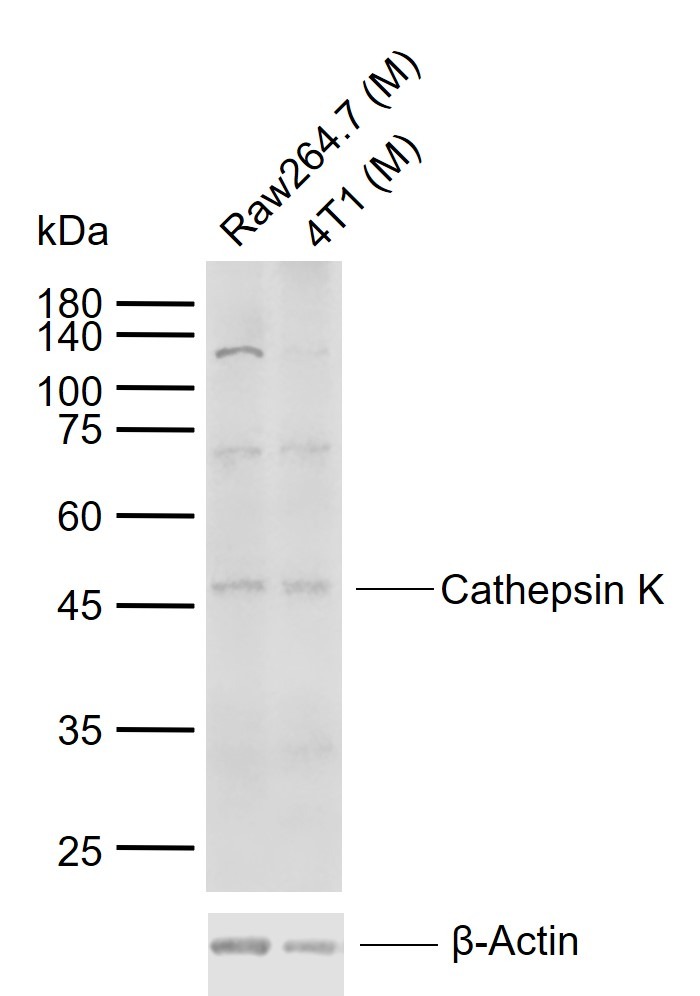Shopping Cart
Remove All Your shopping cart is currently empty
Your shopping cart is currently empty
Anti-Cathepsin K Polyclonal Antibody is a Rabbit antibody targeting Cathepsin K. Anti-Cathepsin K Polyclonal Antibody can be used in IF, IHC-Fr, WB.
| Pack Size | Price | USA Warehouse | Global Warehouse | Quantity |
|---|---|---|---|---|
| 50 μL | $222 | 7-10 days | 7-10 days | |
| 100 μL | $373 | 7-10 days | 7-10 days | |
| 200 μL | $528 | 7-10 days | 7-10 days |
| Description | Anti-Cathepsin K Polyclonal Antibody is a Rabbit antibody targeting Cathepsin K. Anti-Cathepsin K Polyclonal Antibody can be used in IF, IHC-Fr, WB. |
| Synonyms | CTSO2, CTSO, CTSK, Cathepsin X, Cathepsin O2, Cathepsin O, Cathepsin K |
| Ig Type | IgG |
| Reactivity | Mouse (predicted:Human,Rat,Dog,Pig,Cow,Horse,GuineaPig) |
| Verified Activity | Sample: Lane 1: Mouse Raw264.7 cell lysates Lane 2: Mouse 4T1 cell lysates Primary: Anti-Cathepsin K (TMAB-00298) at 1/1000 dilution Secondary: IRDye800CW Goat Anti-Rabbit IgG at 1/20000 dilution Predicted band size: 36 kDa Observed band size: 46 kDa  |
| Application | |
| Recommended Dose | WB: 1:500-2000; IHC-Fr: 1:100-500; IF: 1:100-500 |
| Antibody Type | Polyclonal |
| Host Species | Rabbit |
| Subcellular Localization | Lysosome. |
| Tissue Specificity | Tissue specificityPredominantly expressed in osteclasts (bones). |
| Construction | Polyclonal Antibody |
| Purification | Protein A purified |
| Appearance | Liquid |
| Formulation | 0.01M TBS (pH7.4) with 1% BSA, 0.02% Proclin300 and 50% Glycerol. |
| Concentration | 1 mg/mL |
| Research Background | The protein encoded by this gene is a lysosomal cysteine proteinase involved in bone remodeling and resorption. This protein, which is a member of the peptidase C1 protein family, is predominantly expressed in osteoclasts. However, the encoded protein is also expressed in a significant fraction of human breast cancers, where it could contribute to tumor invasiveness. Mutations in this gene are the cause of pycnodysostosis, an autosomal recessive disease characterized by osteosclerosis and short stature. This gene may be subject to RNA editing. [provided by RefSeq, Jul 2008]. |
| Immunogen | KLH conjugated synthetic peptide: human Cathepsin K |
| Antigen Species | Human |
| Gene Name | CTSK |
| Gene ID | |
| Protein Name | Cathepsin K |
| Uniprot ID | |
| Function | Closely involved in osteoclastic bone resorption and may participate partially in the disorder of bone remodeling. Displays potent endoprotease activity against fibrinogen at acid pH. May play an important role in extracellular matrix degradation. |
| Molecular Weight | Theoretical: 36 kDa. |
| Stability & Storage | Store at -20°C or -80°C for 12 months. Avoid repeated freeze-thaw cycles. |
| Transport | Shipping with blue ice. |
| Size | Quantity | Unit Price | Amount | Operation |
|---|

Copyright © 2015-2026 TargetMol Chemicals Inc. All Rights Reserved.